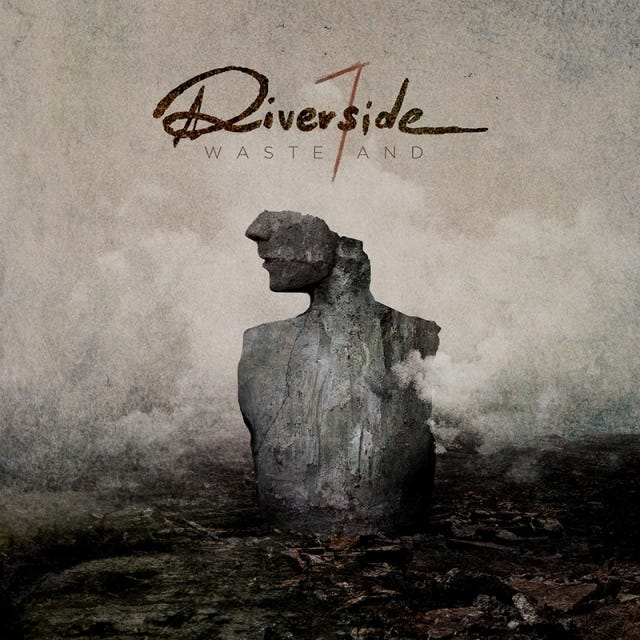A Review of Riverside, Wasteland (Insideout, 2018).
At first, I was surprised that the two best (and best known, at least in American prog circles) Polish bands named their most recent albums, Wasteland. Well, ok, there’s a slight difference. Newspaperflyhunting named its album with a plural. Still, it must be more than a coincidence. Presumably, each took the name either from the Arthurian legends or from T.S. Eliot (who took his from the Arthurian legends). Regardless, the title fits for most of our world of 2023.
I have deeply and passionately loved Riverside since I first encountered their music in 2007. For a while, a club in northern Europe (the Paradiso, I think) had one of the band’s concerts available to stream. I can’t even count how many times I watched and listened to that concert, especially during my 2007-2008 sabbatical. The mixture of intricate and creative harmonies with the energy and honesty of these men came together in astounding ways.
As I’ve noted before, I tend to think of Riverside’s albums as sets novels with the Lunatic Soul albums serving as interludes. Taken together, they form a kind of massive imagined world, though certainly a realistic shadow of our own.
Yet, I’m only a shadow as well—the real reviewer of Riverside at Progarchy is Erik Heter. I’m very eager to read his own thoughts on this album.
Regardless, here goes. . .
Wasteland is an extraordinary release, even by Riverside standards. The album mixes serious intelligence with unceasing energy. If I had to sum up the theme of this album, it would simply be “faith.” Even as we live in the Wasteland, often contented and equally often not, something within us longs for that which is good and true. This album sounds very much like the first two Riverside albums, but there’s a certain and definite maturity and growth as well. This is not a rehash, but a pious struggle toward something even better.
With song titles so blatantly Catholic as “Vail of Tears” and “Guardian Angel,” it’s hard not to see the embrace of faith here.
From the beginning of the album, Duda longs for Eden. “On the Walls, we paint our dreams/Hiding in the Fallout Shelters/While the Gardens of Eden are burning above us.” In this world, we can only be baptized by “acid rain” (track two) as we pursue avarice and sloth “living in a fallen world with fallen minds.” In track three, “Vale of Tears” (a line taken from the Catholic prayer, Salve Regina), Duda crosses his head, lips, and heart on bended knee. In track four, “Guardian Angel,” Duda wrestles with choosing good and evil in a world split into false divisions. He struggles to hear “echoes of morality” hoping for a chance to “expiate my sins.” In lament, the fifth song of the album, Duda begs for his Father to remove him from this world, as the people of it have sold out their humanity. The humans had died to “too much choice/devoid of trust and empathy.” The 9:32 minute long instrumental, “Struggle for Survival,” is simply glorious. Old Riverside calling to the new. In the seventh track, “River Down Below”—a kind of dark folk song—the protagonist dies on a tree and returns to dust. “Wasteland,” the penultimate song and title track, finds our protagonist in purgatory, with “Half dead colours/Residues of my soul/Caught by the wind/Hunting Thirsty for love.” The final song, “The Night Before,” takes us to the edge of Heaven, where we can still see the struggle in the Shadow Realm, but we, ourselves, have assurance of safety and happiness. The only instrument on this last song is, minimalistically and appropriately, piano, with Duda’s voice guiding us into eternity. The ending is both satisfying and painful, a hole in the soul that wants to know what happens next.
There is no doubt that this is one of the most intensely religious albums I’ve heard, ever. Perhaps, the last one so religious (that is, in the sense of art, not propaganda) was Talk Talk’s Laughing Stock. At a time when the Church hierarchy offends to no end—full of corruption, horror, abuse, and cowardice—Duda reminds us that the real essence of the Church is not with the clergy, but with its deep and artful longing for the eternal, the communion of souls, guided by a death on a Friday afternoon.




